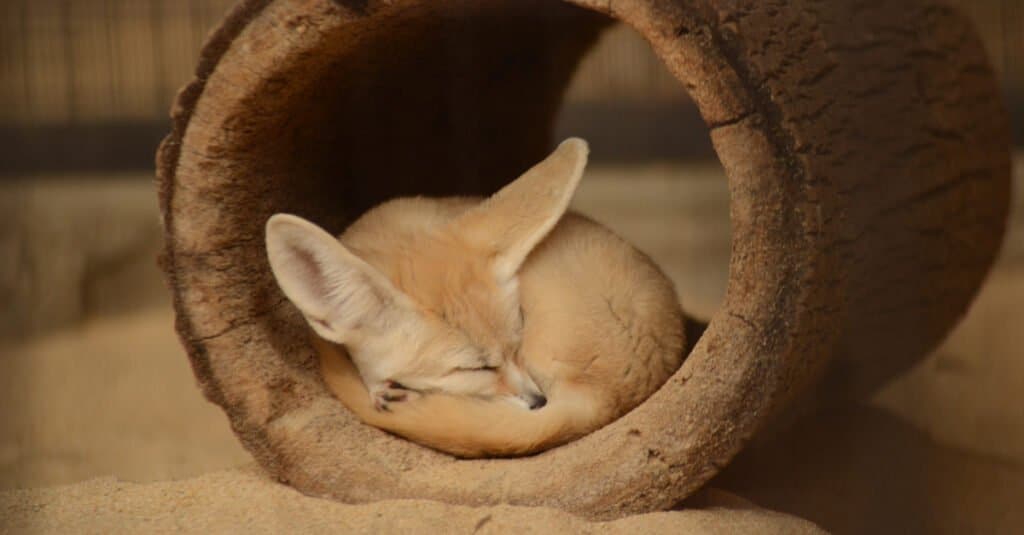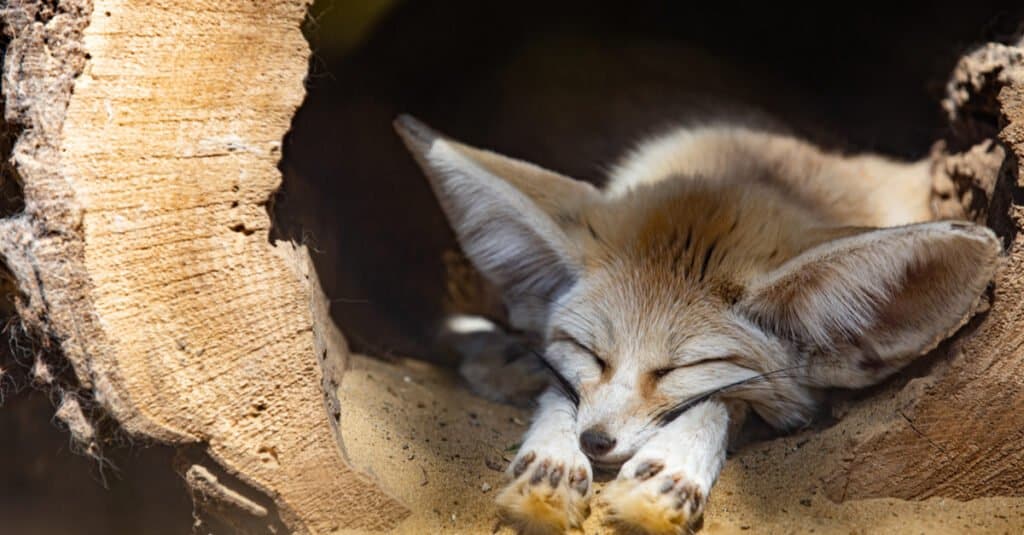
Fennec foxes are adorable animals that many people want as pets because of their cute ears.
©Anolis01/iStock via Getty Images
Exotic pet ownership is a common practice around the world. People love owning exotic animals because it gives the owners a challenge to take care of a new animal and recognition of their peers. Each state has different laws governing what exotic animals are legal in their jurisdiction. A popular animal that breeds contention on legality is foxes.
Foxes are wild mammals related to dogs. They are popular animals in folklore, mythology, and cartoons. Currently, the only foxes legal to own in the United States are fennec foxes.
Fennec fox ownership is legal in some states, but owning a fox is particularly challenging and pet parents must understand it will be an uphill battle living with these tiny foxes.
This article highlights the pros and cons of owning a fennec fox to help potential parents decide if a fennec fox is right for them.
What Are Fennec Foxes

Fennec fox (Vulpes zerda) is a small crepuscular fox native to the deserts of North
Africa
.
©Artush/iStock via Getty Images
Fennec foxes are small foxes native to the Sahara Desert in North Africa and parts of Sinai and Arabia. They are the smallest canids in the world, measuring 14-16 inches long and weighing two to three pounds. Their most notable feature is their large ears and bushy tails which make them extra adorable and enticing for exotic pet ownership.
Fennec foxes live 10 years in the wild but can live up to 14 years in captivity with a healthy diet and appropriate medical care.
Fennec foxes do not make sound when they walk on hard surfaces due to hair lining the bottom of their feet. The hair protects their pads from the hot sun in the desert. Additionally, their ears and tail help them regulate their body temperatures during hot days and cold nights.
In the wild, fennec foxes eat assorted insects, small rodents, lizards, and birds. They chew on berries, roots, fruits, and leaves to keep themselves hydrated when freshwater sources are scarce.
What States Allow Fennec Fox Ownership
According to the World Population Review website, 18 states allow fennec foxes as pets. Bold items indicate states requiring permits for fennec fox ownership.
| Arkansas | Delaware | Florida | Illinois |
| Indiana | Louisiana | Maine | Michigan |
| Mississippi | Nebraska | New York | North Dakota |
| Ohio | Oklahoma | Rhode Island | South Dakota |
| Tennessee | Wisconsin |
Note that New York specifically means New York State. New York City does not allow fennec fox ownership.
What Permits Are Needed to Own a Fennec Fox
Potential buyers should contact the local government’s Department of Fish and Wildlife (DFW). They are capable of providing residents with a list of specific documents for exotic animal ownership.
Alternatively, government-sanctioned exotic animal breeders and shelters will provide permits for exotic animal ownership at the time of purchase.
Owners will have to pay a small fee of $20 or so. Permits must be renewed every year with the breeder or the DFW, which is another small fee.
Where To Buy a Fennec Fox

Many states do not require permits to own a fennec fox.
©natapornL/Shutterstock.com
Obtaining an exotic animal is not as simple as taking a wild animal off the streets. Environmental protection laws prohibit removing exotic animals from their natural habitat as it harms the animals, and the environment, and increases the chances of wild animal attacks at home.
Potential buyers should only purchase a fennec fox from breeders that are licensed by the state or government-approved rescue organizations. Breeders and rescue groups will provide legally binding documents for exotic animal ownership and networks to help owners care for their fennec foxes.
Beware of suspicious pet traders who refuse to discuss legality, permits, or renewal permits because these are outposts for illegal pet trade operations. Purchasing an animal from this group is illegal and the animals are not accustomed to human handling, making them more likely to attack or escape.
How Much Do Fennec Foxes Cost

Some breeders may suggest adopting two foxes if one has developed a close bond with another.
©icemanphotos/Shutterstock.com
A young fennec fox will cost $1,500-$3,000 each, with the average price being $2,500.
Pet parents should aim to buy fennec foxes while they are young to form closer bonds with them as they grow. Adult fennec foxes will be timid and defensive around strangers. Breeders and rescue groups actively help young foxes adjust to humans, allowing them to be less timid around people.
How To Care for a Fennec Fox

With training, patience, and positive reinforcement, fennec foxes may allow their owners to hold them.
©petrenkod/iStock via Getty Images
Taking care of a fennec fox is not like taking care of a small-breed dog. While they are both small, fennec foxes are still wild animals and will be resistant to training, listening to commands, and socializing with other people.
Temperament
Fennec foxes are independent and timid animals by nature. They are easily startled by loud sounds, and large objects, and take a while to adapt to new environments and people. Fennec foxes rarely bite, preferring to run away and hide rather than fight. However, when frightened in a corner, they may lash out at those around them.
Still, young foxes who are familiar with humans at an early age are slightly easier to handle. They may feel comfortable coexisting with animals of equal size like cats or small dogs. Fennec foxes should not be kept with rodents because they will see rodents as food. Some foxes may become comfortable enough with their owners to allow them to be held and petted.
Fennec foxes are very noisy and chatty animals. They communicate with barks, chirps, cries, and yowls with other foxes to ward off predators. Owning a fennec fox will mean hearing these sounds throughout the night when they are active.
Exercise
In the wild, fennec foxes will run and dig for hours in the desert. A single fennec fox can dig up holes 3 feet deep to avoid the heat and stay cool.
Owners will need to exercise their foxes with plenty of toys and space to run. These animals need consistent engagement to release their energy, otherwise, they will chew on furniture and dig in the floors to amuse themselves.
Trainability

Fennec foxes do not like their ears being touched because they are extra sensitive.
©Colin Eaton/iStock via Getty Images
It is possible to train fennec foxes to use a litter pan or understand basic commands, but it is extremely difficult. Because they are wild animals, they have not adapted to learning commands or instructions.
Adopting a young fennec fox increases the chances of them learning their name, words like “no” or “drop it,” as well as “treat” or “food.” Additionally, those commands come with different tones which foxes may understand more than the actual words.
With consistent training and positive reinforcement, foxes can be trained to go for leash walks and use pee pads. Some foxes will instinctively want to use a litter box instead to cover their droppings as a protective method similar to cats as a way to hide their scent.
Owners must be patient with their foxes during training sessions. It will take time for them to learn what the owner wants and getting angry or upset will make the foxes timid or nervous.
Housing

Without proper security, fennec foxes can escape by climbing over fences or digging under them.
©MONGUN101/iStock via Getty Images
Fennec foxes are good as indoor and indoor/outdoor pets. These animals are familiar with desert climates, meaning they need temperatures of 68 degrees Fahrenheit or higher to feel comfortable and healthy.
Indoor foxes can comfortably live in a warm house as long as they have plenty of space to run around and toys to interact with. Having a space for them to dig and play will release their energy and cater to their natural instincts. Additionally, keeping them indoors will protect them from predators like hawks or other wild animals carrying parasites. Provide them with a large dog crate where they can sleep, store their toys, or keep them temporarily confined. Fennec foxes should not be left to run around the house without supervision.
Fennec foxes should not be kept outdoors all the time because they are not familiar with fluctuating weather in North America. Still, providing an outdoor shelter or playpen for them is an excellent option to help vent their energy successfully.
Owners can build a large enclosure with plenty of sand or dirt for them to run around and dig freely. The enclosure should have a bottom of concrete or a way to prevent them from accidentally digging their way out of their enclosure. It should be 5-6 feet high and have an inward curve to prevent them from climbing over the top.
Diet

Rabbit meat with vegetables is an excellent protein for foxes.
©Studioimagen73/iStock via Getty Images
Fennec foxes are omnivores, preferring to eat insects, rodents, roots, fruits, and nuts. Specific fennec fox food can be difficult to obtain, but a breeder should have sufficient information on which foods will provide them with a balanced meal.
For optimal health, fennec foxes should eat a mixture of raw food or wet food with assorted vegetables and taurine supplements. Wild fennec foxes die from sickness and malnutrition because they do not get enough taurine in their bodies. Taurine helps the body process bile and balance salt, fluids, and minerals. Taurine-rich foods include liver, kidneys, and seafood.
Additionally, speaking with an exotic animal veterinarian and nutritionist will help find the perfect balance of meats, vegetables, and supplements to keep them healthy.
Fennec foxes should be fed twice a day. Pet parents can offer them fruits like cherries, cranberries, and blueberries as a treat every couple of days.
Veterinary Care

Many foxes will experience liver or kidney disease because of malnutrition.
©Diy13/iStock via Getty Images
Owners must take their fennec foxes to an exotic veterinary specialist for medical check-ups and emergency visits.
Unfortunately, due to a veterinarian shortage in the past several years, finding available medical attention for animals is difficult. Exotic veterinarians are difficult to find already because of extra training to cover a wide variety of species.
Fennec fox owners should speak with their breeder or contact local zoos that have exotic veterinarians on their staff for support. Exotic animal exams may cost around $100 or $120 per visit, which is more than regular office exam prices.
Depending on their age, owners should bring their foxes to a medical professional once or twice a year for wellness checks.
Many domestic fennec foxes will suffer from:
- Liver disease
- Kidney disease
- Skin infections
- Parasites
- Obesity
Grooming
Thankfully, fennec foxes are like cats, they enjoy being clean. These animals will groom themselves often by giving themselves dirt baths. There is no need to take them to the groomers or give them baths. Bathing a fennec fox could cause problems because if water gets trapped in their large ears, it can lead to ear infections which are difficult to remove in exotic animals.
Fennec foxes shed a lot throughout the year. Shedding can be managed by using a wire or slicker brush available for cats at any pet retail store. Introduce brushing to young foxes so they associate grooming with positive engagement.
Summary: Do Fennec Foxes Make Good Pets
Here is a clear tally regarding the pros and cons of fennec fox ownership.
| Pros | Cons |
|---|---|
| Cute and exotic animals intrigue | Timid and can be shy |
| Self-cleaning | Very vocal and noisy |
| Can live alone or with other similar size animals | Expensive to purchase |
| Trainable (but difficult) | Difficult to create a balanced diet |
| Good for owners who like to exercise | Difficult to find medical care |
| Expensive medical bills | |
| Boredom can lead to destructive behavior |
Despite there being more cons than pros, issues like destructive behavior and expensive medical bills are common for many domestic animals.

Owners who cannot handle difficult animals should not adopt them as pets.
©wrangel/iStock via Getty Images
If an owner is capable of finding a reputable breeder or exotic animal rescue, can comfortably afford medical care, and has the time to exercise, train, and prepare meals daily, then a fennec fox could make a good pet.
The photo featured at the top of this post is © Chill Chillz/Shutterstock.com
Thank you for reading! Have some feedback for us? Contact the AZ Animals editorial team.






